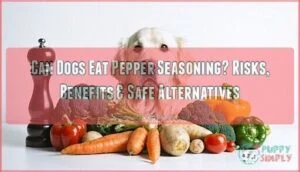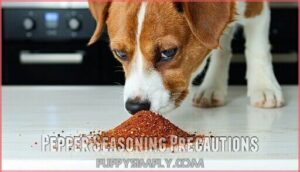This site is supported by our readers. We may earn a commission, at no cost to you, if you purchase through links.

Black pepper and similar seasonings can irritate your pup’s stomach and respiratory system, causing uncomfortable sneezing fits and digestive upset.
While a tiny amount that accidentally drops from your dinner plate won’t require an emergency vet visit, it’s smart to keep seasoned foods away from your furry friend.
The spicy compounds simply don’t agree with dogs’ sensitive systems.
Your dog’s taste buds work differently than yours anyway, so they’re perfectly happy with plain food.
There are safer ways to add variety to your pet’s meals that won’t leave them feeling uncomfortable.
Table Of Contents
- Key Takeaways
- Dogs and Pepper Seasoning
- Can Dogs Eat Pepper
- Pepper Seasoning Health Risks
- Benefits of Pepper for Dogs
- Salt and Pepper for Dogs
- Types of Pepper for Dogs
- Alternatives to Black Pepper
- Human Foods Safe for Dogs
- Pepper Seasoning Precautions
- Safe Seasoning for Dog Food
- Frequently Asked Questions (FAQs)
- Can dogs eat chicken seasoned with pepper?
- Can dogs eat food seasoned with salt and pepper?
- What spices are not safe for dogs?
- Are any spices safe for dogs to consume?
- What should I do if my dog consumes black pepper?
- Is there any way to make pepper safe for my dog?
- What are some signs of stomach upset in dogs?
- How much pepper seasoning is too much for my dog?
- How much pepper seasoning is too much?
- Can puppies eat pepper seasoned food safely?
- Conclusion
Key Takeaways
- You shouldn’t give your dog pepper seasoning regularly – while small amounts won’t poison them, black pepper and similar spices can irritate your pup’s stomach and respiratory system, causing uncomfortable sneezing fits and digestive upset.
- Some peppers are safe while others are toxic – bell peppers are nutritional champions packed with vitamins, but you should never give your dog chili peppers, cayenne, or ornamental varieties like Dragon’s Breath peppers, which can cause serious toxicity.
- Watch for signs of pepper overconsumption – if your dog accidentally gets into seasoned food, monitor them for vomiting, diarrhea, excessive sneezing, or breathing difficulties, and contact your vet if symptoms persist or worsen.
- Choose dog-safe seasoning alternatives instead – you can safely flavor your dog’s food with turmeric, ginger, oregano, parsley, or cinnamon, which offer health benefits without the risks that come with pepper seasoning.
Dogs and Pepper Seasoning
You might be tempted to share seasoned food with your dog, but not all spices are safe.
Regarding pepper seasoning, understanding the risks and safe options is vital for their health.
Safe Pepper Types
When wondering "is pepper safe" for your furry friend, you’ll be relieved to know some pepper varieties won’t hurt them.
Bell peppers are nutritional champions, packed with vitamins A, C, and E.
Here are three dog-safe pepper options:
- Bell peppers – All colors contain zero capsaicin
- White pepper – Milder than black, use sparingly
- Pink peppercorns – Technically safe in tiny amounts
Toxic Pepper Types
Never underestimate pepper toxicity dogs face with certain varieties.
Ornamental peppers, chili pepper dogs shouldn’t consume, and super-hot varieties like Dragon’s Breath create serious toxic pepper effects.
Warning: Dragon’s Breath and ornamental peppers pose extreme toxicity risks that can endanger your dog’s life.
These toxic spices dogs encounter can trigger pepper poisoning** symptoms including severe irritation and respiratory distress.
Ghost peppers and Carolina Reapers represent extreme pepper toxicity levels, making them dangerous toxic foods for dogs requiring immediate pet poisoning prevention measures.
Can Dogs Eat Pepper
Despite what you might think, dogs can technically eat small amounts of black pepper without immediate danger. However, pepper isn’t something you should regularly share with your furry friend.
Most dogs dislike the spicy flavor, and their digestive systems aren’t built to handle peppery foods like ours.
Here’s what you need to know about pepper for dogs:
- Black pepper dogs can tolerate in tiny amounts, but it’s not recommended as a regular treat
- Chili pepper dogs should never consume, as capsaicin causes serious digestive distress
- Safe amounts mean occasional microscopic quantities only – think accidental licks, not intentional feeding
When considering can dogs have pepper, remember that pepper toxicity dogs experience varies by type and amount. While pepper benefits exist for humans, dogs don’t gain nutritional advantages.
Pepper allergies can develop, making pepper alternatives a smarter choice for flavoring your dog’s meals safely.
Pepper Seasoning Health Risks
While small amounts of pepper seasoning won’t seriously harm your dog, larger quantities can cause digestive problems and respiratory irritation.
You’ll want to watch for signs like stomach upset, vomiting, or sneezing fits if your pup accidentally gets into your pepper shaker, which can lead to respiratory irritation.
Stomach Upset
When your dog consumes pepper seasoning, stomach upset becomes the primary concern.
Pepper seasoning hits your dog’s stomach first—watch for telltale signs of digestive distress.
Pepper side effects dogs experience include vomiting and diarrhea due to spice sensitivity disrupting their gut microbiome.
Can dogs have pepper? Small amounts rarely cause issues, but excessive consumption overwhelms their digestive enzymes.
Monitor your pup closely—their canine digestion system isn’t built for spicy adventures like yours.
Sneezing and Breathing Problems
Pepper inhalation creates immediate airway irritation in dogs, triggering intense sneezing fits and nasal irritation.
When your pup accidentally inhales pepper particles, you’ll notice respiratory distress as their sensitive airways react.
Breathing difficulties can escalate quickly, especially with fine pepper dust. These sneezing triggers represent serious dog health risks, making toxic spices for dogs particularly dangerous when airborne.
Benefits of Pepper for Dogs
While pepper poses risks for your dog, small amounts of black pepper can be safe when used properly.
You’ll find that minimal pepper seasoning won’t harm most dogs, though it offers limited nutritional benefits compared to dog-specific seasonings, with black pepper being a key consideration.
Impact Of Emerging Trends
Recent dietary shifts toward personalized nutrition are reshaping how you approach spices safe dogs can enjoy.
Health monitoring apps now track ingredient sourcing, helping you identify better spice alternatives for dog food.
These emerging trends promote smarter seasoning for dogs choices, encouraging you to prioritize dog health through evidence-based dog nutrition decisions rather than guesswork.
Challenges Facing Current Systems
Current dog nutrition systems face significant scalability issues when determining if your dog can eat pepper seasoning safely.
System limitations create gaps in personalized guidance, while data integration problems prevent thorough spice databases.
Security vulnerabilities in pet food apps compromise safety recommendations.
Cost optimization pressures often sacrifice quality research on spices safe for dogs, leaving pet owners exploring conflicting information about seasoning for dogs.
Opportunities For Future Growth
While research continues exploring Dietary Innovations and Personalized Nutrition for dogs, you’ll likely see more Breed-Specific Needs addressed through specialized dog food formulations.
Supplement Research is advancing Preventative Care options, creating safer alternatives to traditional seasonings.
Future dog treats may incorporate beneficial pepper compounds without harmful effects, revolutionizing dog nutrition and pet health through targeted, science-backed ingredients.
Salt and Pepper for Dogs
Most dog owners wonder if their furry friends can handle the classic salt and pepper combo from their dinner table.
While small amounts won’t send your pup to the emergency vet, both seasonings require careful consideration for your dog’s health.
Salt toxicity becomes a real concern when dogs consume excessive amounts, leading to dehydration and kidney problems.
Pepper allergies, though rare, can cause digestive upset in sensitive dogs.
Here’s what you need to know:
- Safe amounts: A pinch of salt and pepper in shared food won’t harm most dogs
- Seasoning alternatives: Dog-safe herbs like parsley or turmeric offer flavor without risks
- Veterinary advice: Always consult your vet before regularly adding seasonings to your dog’s diet
- Monitor reactions: Watch for sneezing, stomach upset, or excessive thirst after consumption
Your dog’s dietary needs differ substantially from yours, so moderation remains key when sharing seasoned foods.
Types of Pepper for Dogs
When you’re considering pepper seasoning for your dog, you’ll need to understand which types are safe and which pose serious health risks.
Different pepper varieties affect dogs differently, with some causing mild stomach upset while others can trigger dangerous reactions that require immediate veterinary care.
Green Peppercorns
Many pet owners wonder about green peppercorns and their safety for dogs.
These unripe peppercorns offer a milder flavor than black pepper but still require caution.
While small amounts won’t harm most dogs, proper peppercorn preparation and sourcing matter for safe food dogs can enjoy.
| Aspect | Green Peppercorns | Safety Level |
|---|---|---|
| Toxicity | Low in small amounts | Moderate caution |
| Digestive Impact | May cause mild upset | Monitor closely |
| Preparation | Remove before serving | Essential step |
| Benefits | Minimal for dogs | Not recommended |
| Alternatives | Dog-safe herbs exist | Preferred option |
Cayenne Pepper
Cayenne pepper isn’t safe for your furry friend.
This fiery spice packs 30,000-50,000 Scoville Units and contains capsaicin that triggers oral irritation, digestive upset, and breathing problems in dogs.
Unlike safe food dogs can enjoy, cayenne pepper for dogs poses serious health risks.
Skip this spice entirely when considering dog dietary needs.
Your pup’s sensitive system can’t handle this heat level safely.
Hot Pepper
Hot peppers pack a fiery punch that can spell trouble for your four-legged friend.
These spicy varieties contain high levels of capsaicin, triggering immediate gastrointestinal distress and painful burning sensations.
When wondering "can my dog eat pepper," remember that red pepper dogs should avoid includes jalapeños, habaneros, and serranos.
Capsaicin toxicity varies among breeds, but pepper sensitivity affects all dogs, and it’s crucial to choose safe alternatives instead.
Alternatives to Black Pepper
Several flavorful options can replace black pepper in your dog’s meals without compromising their health. You’ll find plenty of safe spices for dogs that add taste while supporting their wellbeing.
Here are five excellent dog spice alternatives to examine:
- Turmeric – This golden spice offers anti-inflammatory benefits and adds earthy flavor to homemade dog food spices
- Ground ginger – Settles upset stomachs while providing a gentle warming taste as one of the best palatable alternatives
- Dried oregano – Contains antibacterial properties and works as effective dog food seasoning in small amounts
- Fresh parsley – Acts as natural breath freshener among safe herbs while adding mild flavor
- Ceylon cinnamon – Reduces flatulence and joint pain, making it ideal among nutritional boosters
These spice substitutes let you enhance your dog’s meals safely. Start with tiny pinches since dogs taste food differently than humans. Always consult your veterinarian before introducing new dog dietary supplements to verify they’re appropriate for your pet’s specific health needs.
Human Foods Safe for Dogs
Beyond pepper alternatives, you can share plenty of safe human foods with your furry friend.
Plain cooked chicken, rice, and sweet potatoes make excellent additions to your dog’s diet.
Fresh blueberries, carrots, and green beans provide healthy snacks that most dogs love.
However, toxic human foods lurk in your kitchen.
Chocolate, grapes, onions, and garlic can seriously harm your pet.
Even seemingly harmless foods like avocado and macadamia nuts pose risks.
When preparing homemade dog food, stick to dog-safe ingredients and maintain a balanced dog diet.
Your dog’s regular kibble should provide complete nutrition, so treat moderation is key.
Safe human foods should never exceed 10% of their daily calories.
Always research before sharing your meal.
Pet safety depends on knowing which foods help versus harm.
When in doubt, consult your veterinarian for personalized dog nutrition advice.
Pepper Seasoning Precautions
You’ll need to watch for signs of trouble when giving your dog pepper seasoning, as too much can cause stomach upset and breathing problems.
Even small amounts can trigger allergic reactions in sensitive dogs, so start with tiny portions and monitor your pet’s response carefully to avoid breathing problems.
Overconsumption Risks
While some spices pose minimal risk in tiny amounts, overconsumption creates serious dog dietary risks.
Large quantities can cause organ damage and toxicity levels that vary by breed sensitivity.
Dosage concerns become critical when dogs access seasoning containers or heavily spiced foods.
Long-term effects from repeated exposure include digestive problems and potential liver complications requiring veterinary intervention.
Allergic Reactions
Some dogs develop pepper allergies, showing symptoms like itching, swelling, or digestive upset.
Identifying allergens requires careful observation after exposure. Reaction severity varies by breed predisposition and individual sensitivity.
Watch for anaphylaxis signs including difficulty breathing or collapse. Veterinary intervention becomes necessary when canine allergies worsen.
Understanding your pet’s dietary restrictions helps prevent dangerous allergic reactions to pepper seasoning.
Safe Seasoning for Dog Food
When you’re looking to add flavor to your dog’s meals, you’ll need to stick with dog-safe seasonings that won’t harm their health.
Several herbs and spices like basil, ginger, turmeric, and parsley can safely enhance your pet’s food.
You must avoid toxic ingredients such as garlic, onion powder, and nutmeg that appear in many human seasonings, to ensure your pet’s health and safety with careful selection.
Healthy Seasoning Options
When choosing safe seasonings for dogs, basil stands out as a powerhouse herb packed with antioxidants and anti-inflammatory properties.
Turmeric offers excellent spice benefits for joint health, while ginger soothes upset stomachs.
Cinnamon and fennel round out your dog-safe spices arsenal. You can even find basil products for dogs online.
Remember, moderation matters with any addition to your pup’s balanced diet. Always prioritize vet consultation before introducing new safe herbs to guarantee the best dog health benefits.
Toxic Seasoning Ingredients
Several spices create serious health risks for your dog.
Garlic and onion cause anemia risks by destroying red blood cells.
Nutmeg’s toxicity triggers hallucinations and liver damage.
Dangerous herbs like bay leaves contain harmful additives that cause vomiting.
You can find seasoning product options online.
Cocoa powder, cloves, and allspice rank among the most toxic spices for dogs, requiring immediate veterinary attention if consumed.
Frequently Asked Questions (FAQs)
Can dogs eat chicken seasoned with pepper?
Like walking a tightrope, you can share lightly peppered chicken with your dog, but heavily seasoned pieces are off-limits.
Small amounts won’t harm them, though most dogs dislike spicy flavors anyway.
Can dogs eat food seasoned with salt and pepper?
Small amounts of salt and pepper won’t harm your dog, but heavily seasoned food should be avoided.
Stick to lightly seasoned dishes and monitor for digestive upset when sharing human food.
What spices are not safe for dogs?
Garlic, onion, nutmeg, cocoa powder, and bay leaves top the danger list for dogs.
These toxic spices can cause serious health problems including anemia, liver damage, and neurological issues.
Always check ingredients before sharing seasoned food.
Are any spices safe for dogs to consume?
Yes, many spices are safe for your dog.
Basil, chamomile, cilantro, cinnamon, ginger, oregano, parsley, rosemary, sage, thyme, and turmeric work well in moderation.
Always consult your vet before adding new seasonings.
What should I do if my dog consumes black pepper?
Don’t panic if your dog sneaks a peppercorn.
Monitor them for digestive upset like vomiting or diarrhea.
Offer fresh water and watch for unusual behavior.
Contact your vet if symptoms persist or worsen.
Is there any way to make pepper safe for my dog?
You can’t make pepper truly safe for dogs since it’s naturally irritating to their digestive system.
Instead, stick to dog-safe seasonings like small amounts of turmeric, ginger, or parsley to flavor their food safely.
What are some signs of stomach upset in dogs?
Watch for vomiting, diarrhea, loss of appetite, excessive drooling, lethargy, or restlessness in your dog.
You’ll also notice bloating, gas, or whimpering.
If symptoms persist or worsen, contact your vet immediately for guidance.
How much pepper seasoning is too much for my dog?
Small amounts of black pepper won’t harm your dog, but large quantities can cause stomach upset. If your pup’s food tastes peppery to you, it’s probably too much for them.
How much pepper seasoning is too much?
Like walking a tightrope, you’ll want to keep pepper seasoning minimal for your pup.
A tiny pinch won’t hurt, but anything more than what sticks to lightly seasoned chicken could upset their stomach.
Can puppies eat pepper seasoned food safely?
Puppies shouldn’t eat pepper-seasoned food.
Their digestive systems are more sensitive than adult dogs, making them prone to stomach upset, diarrhea, and respiratory irritation.
Stick to puppy-specific food for their safety.
Conclusion
Pepper precautions protect your pup’s precious palate and prevent potential problems.
While dogs technically can survive small amounts of pepper seasoning, it’s simply not worth the risk of digestive distress or respiratory irritation.
Your furry friend doesn’t need spicy seasonings to enjoy their meals – their taste buds work differently than yours.
Skip the pepper and stick to dog-safe alternatives instead.
When wondering "can dogs eat pepper seasoning," remember that plain food keeps your companion comfortable and healthy, and always consider your furry friend.
- https://onepackplan.petpartners.com/about-dr-nell-ostermeier
- https://spotpet.com/blog/authors/dr-sperry
- https://www.merckvetmanual.com/toxicology/food-hazards/chocolate-toxicosis-in-animals
- https://www.vets-now.com/2017/06/10-signs-dog-pain/
- https://www.petmd.com/dog/centers/nutrition/evr_dg_pain-medication-for-dogs
















